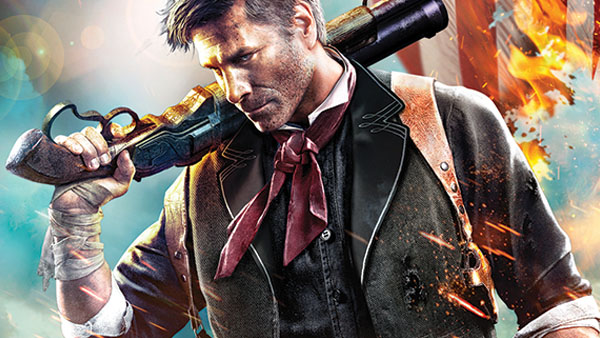Without a doubt, Bioshock Infinite’s narrative is among the most sublime ever seen in the medium, treating gamers to philosophical conundrums and scientific paradoxes that most are still contemplating weeks after the game’s release. Indeed, one could devote entire essays to any one of its many weighty themes, from the traps of predestination to the nature of evil. But the game does more than challenge our conceptions of ethics and perceptions of reality—it also succeeds in critically damaging that long known fixture in digital storytelling known as the “silent protagonist.”
History, of course, is rife with this longstanding staple of game design. Perhaps it’s a surviving legacy of a time when games were simply about earning points and enjoying brief highs of flickering euphoria. No one, for instance, questioned why Pac-Man never spoke in his early maze-running days, or why Mario had nothing to say as he romped from left to right. But games continued to grow in sophistication, soon offering relatively complex tales to go along with their adventures. The heroes of Dragon Warrior and The Legend of Zelda traversed enormous kingdoms, interacting with allies and chasing villainy. Soul Blazer saw its angelic avatar freeing souls in a land lost to a terrible evil. Chrono Trigger sent its star traveling through time itself to rewrite the fate of the world. And the trend continued into the 3-D age, depicting everything from Gordon Freeman’s struggle for survival in Half-Life to Samus’ archaeological detective work in Metroid Prime. And yet, despite the differences in genres, these titles all shared one key component in common—their heroes never spoke.

Why don't you talk more, little dude?
But why? In nearly every other form of storytelling, the main character speaks, has a personality—is otherwise relatable. Should video games be any different? Is the narrative somehow enhanced when Link’s supporting characters, whether they be Zelda, Tingle, or a lowly villager, overshadow him in both complexity and charisma? Are we supposed to take Alyx’s romantic interest in Gordon Freeman seriously when he can’t so much as grunt at her? Are we supposed to feel bad for Isaac Clarke, Dead Space’s tepid lead, when he finally learns of his girlfriend’s tragic death?
Fortunately, developers seem to be catching on. Isaac did find his voice, to great success, in Dead Space 2. Mass Effect, a game that could have easily skirted by with a blank hero, instead provided a unique voice to both Commander Shepard’s male and female forms. Even the traditionally stoic and monotone Master Chief has been allowed to reveal his soul, if just a little, in his latest outing.
Which brings us back to Bioshock Infinite. While the original game (we’ll pretend the second one never happened) used a (mostly) silent protagonist to convey its macabre tale, the new game does something surprising—not only does the lead, Booker Dewitt, speak and share his opinions on the matters at hand, he also drives the narrative forward through his interactions with Elizabeth and dim reflections on his own dubious, haunted past. In fact, while many fans claim young Elizabeth steals the game’s “show,” Booker’s shady history coupled with the possible chance for his redemption is equally compelling. Rather than controlling a generic cypher traipsing at Elizabeth’s heels, the player is instead presented with two complex, real characters with which to interpret Infinite’s convoluted world. Without Booker, the game would lose half its soul.

Oh Booker, I feel like I really know ya!
Not convinced? Imagine a Zelda game in which Link yearned for his princess’ unrequited love, or, like Ganon, was finding himself succumbing to dark desires. Or if Bioshock’s “Jack” had demonstrated true moral agony each time he had to choose between sparing a Little Sister’s life or harvesting her for his own unlikely survival. These are the exquisite gains and nuances an active protagonist with a mind of his/her own provides.
And why the silent protagonist needs to disappear, forever.
Thanks to www.gematsu.com and www.606studios.com for the pics.





Comments